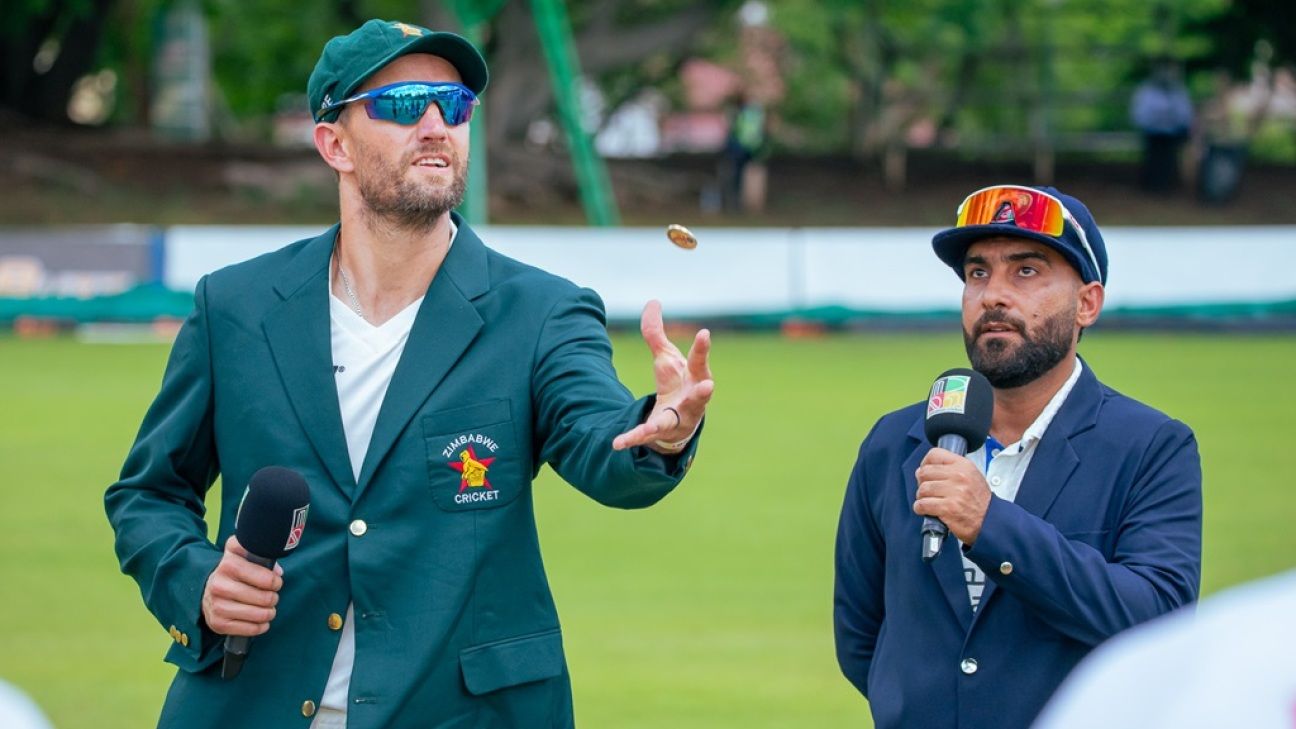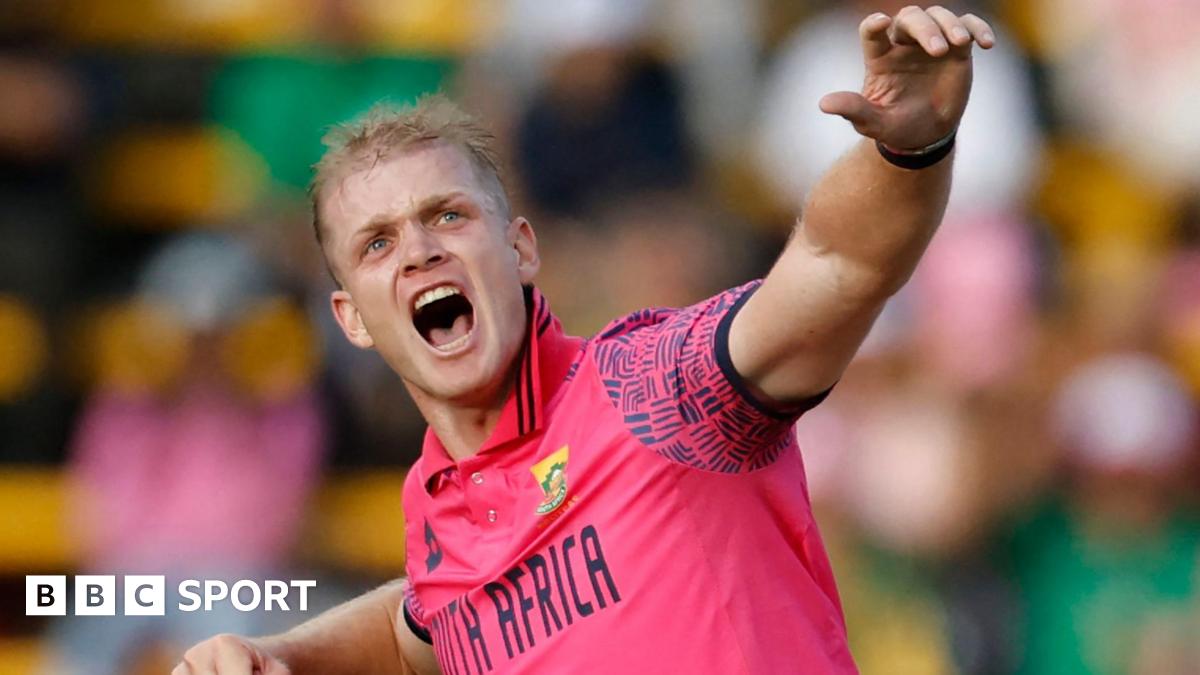What does Test cricket mean to the Test teams outside the World Test Championship?

The sky was blue, Afghanistan were in whites, ready to re-acquaint themselves with the red ball. They were back in Greater Noida, their old home outside Delhi, for their first Test against New Zealand. New Zealand would likely have been excited by a new opponent, but they were probably looking at the game more as prep for their forthcoming Tests in Sri Lanka and India.
On the surface, there were uncontrollable reasons – mainly rain – for the Test being abandoned without even the toss having taken place. Still, the first two days being washed out due to the after effects of rain outside the hours of play was hard to explain.
Gary Stead and Jonathan Trott, New Zealand’s and Afghanistan’s respective coaches, expressed their disappointment and acknowledged the compromises involved in the organisation of the Test. And so a rare opportunity for Afghanistan to play a Test match went almost literally down the drain.
****
When the ICC first approved the idea of a World Test Championship in 2010, Zimbabwe were supposed to be among the ten participating teams in the league when it kicked off three years later. However, it was postponed and only actually approved in 2017.
When the WTC was finally launched in 2019, only nine Full Members were included. Zimbabwe, as well as the latest Full Members, Afghanistan and Ireland (who were awarded that status in 2017) missed out. No specific reasons were given for their exclusion, but it was thought to be because both the latter two members were newly inducted and Zimbabwe had lost their way because of the political interference in their cricket in the 2000s.
Those three teams (with the major ones) got spots in the ODI Super League, which did provide regular opportunities to lower-ranked sides, and an Associate team, to play against Full Members. But that league was discontinued after the 2023 ODI World Cup, with just one cycle completed. The Intercontinental Cup, once a steady source of red-ball exposure for Associate teams between 2004 and 2017, had also been scrapped by then.
Three cycles into the WTC, there still is no pathway for a new team to enter the championship. There is no system of promotion and relegation, or any other meritocratic provision to challenge the positions of the existing teams.
“For you to be a Full Member, you need to play all three formats. That’s an eligibility criteria,” Tavengwa Mukuhlani, Zimbabwe Cricket’s chair, says, “So every member must have an equal and fair opportunity to play the three formats, without discrimination. The current set-up defeats the purpose of being a Test-playing Full Member.”
“The current set-up defeats the purpose of being a Test-playing Full Member”
Tavengwa Mukuhlani, Zimbabwe Cricket chair
Since the start of 2018, the year Afghanistan and Ireland played their first Tests, the three non-WTC teams have played 28 Tests collectively. That’s an average of under four Tests between the three of them per year.
Last year, which offered the three sides six Tests between them was kind to them. Ireland won both their matches and hosted one for the first time in six years – although that needs to be weighed against the cost of giving up the chance to host the Australia men’s side for the first time. The Boxing Day Test, Zimbabwe hope, could grow into a tradition. Afghanistan played three Tests in three different countries.
Trott hopes that the Test team can follow in the footsteps of their high-achieving white-ball team which beat England, Sri Lanka, and Pakistan in the last ODI World Cup and made the T20 World Cup semi-final last year. But that seems a lofty ambition.
The abundant talent they are blessed with has helped Afghanistan progress farther and faster than their non-WTC counterparts. However, they are more affected by the proliferation of franchise leagues, where their players are in demand. Rashid Khan, for instance, Afghanistan’s captain and go-to match-winner, is a mainstay across multiple T20 leagues.
Afghanistan are scheduled to play 21 Tests between 2023 and 2027, Zimbabwe 20 and Ireland 12 apiece under the ICC’s men’s Future Tours Programme (FTP). However, Afghanistan have played only five so far (New Zealand Test included) about halfway into that four-year period.
The cost of one lost Test is magnified when you factor in other changes to their calendar. Afghanistan were set to play two Tests against Bangladesh in June 2023 but only played one, due to scheduling issues. They then had a multi-format series against Zimbabwe in July 2023, where too a Test was dropped (scheduling issues again). Their multi-format series against Bangladesh in 2024 was initially postponed and then turned into a three-match ODI series.
“It’s the FTP,” Trott says. “You deal with it as and when it happens, and when Test matches come up and first-class cricket comes up, you want players to perform.”
Trott says Afghanistan’s high-performance centre looks after player development across age groups and formats in the country, and that the team has access to very good facilities in the UAE. However, only regular participation in first-class cricket and Test wins against the top teams can make for a pathway into the WTC, he says.
“It’s just that white-ball cricket is more what they’re used to, and they’ve played a lot more of it. And that’s the only reason why I think the more Test matches that Afghanistan play, the better, the more first-class cricket they play, the better they’ll be.”
While Afghanistan have had the Ahmad Shah Abdali 4-day Tournament, a multi-day competition running since 2011, which gained first-class status in 2017, the number of teams participating in it has come down from six to four. To its credit, the competition survived Covid.
But the ability to fine-tune players for Test cricket – on demand – is still not within their grasp, as perhaps reflected in their loss to Ireland in Abu Dhabi in a close Test in March 2024. “We could’ve easily won that one if we’d played a little bit better,” Trott says.
Ireland registered their first home Test win when they beat Zimbabwe in July, in another seesawing Test.
“Three cycles into the WTC, there still is no pathway for a new team to enter the championship. There is no system of promotion and relegation to challenge the positions of the existing teams”
“The more that we play international cricket,” Warren Deutrom, Cricket Ireland’s CEO, says, “the more the players get used to the rhythms of international cricket. The wins show that our players are learning very quickly, and our players are very talented, and I think you ask any player, they love playing Test cricket.”
Not that he thinks putting a large amount of Test cricket into the crowded international calendar is the best thing to do. “I think we would prefer to potentially increase it gradually, over a period of time. I don’t subscribe to the theory that more content automatically makes for a better FTP.”
The Emerald Challenge match, the previous edition of which was in 2019, was Ireland’s only domestic first-class game in 2024, and that was washed out. For the Test they played against Afghanistan, Ireland captain Andy Balbirnie says they spent about a week or so in Dubai just practising with the red ball to get used to it.
Having to rely on instinct for selection is also a problem, because of the lack of data. “We’ve had selection meetings that have been based on how the person has performed in the nets, in the build-up to a Test match,” Balbirnie says. “We can’t go on anything else. A lot of the top nations are picking [players] on first-class records, whereas we just don’t do that. We can’t do that.
“Do we have a hunch? Is someone looking like they could do something in Test cricket? So we have some very interesting selection meetings where a lot of names are thrown around.”
Be that as it may, Balbirnie and many of his team-mates have demonstrated that regular exposure to the longer format can lead to a sustainable career. “My international game was developed by playing nations like Scotland, Netherlands, Oman, Namibia, all these teams [in the Intercontinental Cup],” he says. “And there was nothing between the teams, it was always close cricket. And then, from nowhere, [Ireland] got out of it into the next level, for whatever reason – I don’t know if it was [because of] a good salesperson in the meetings, a good CEO, someone who could sell us as a team.
“Obviously we’ve put in good performances, but it didn’t seem that fair that we just went up above and left everyone low below us, because even now, when we play Scotland and Netherlands, there’s not a lot between the teams. There are bowlers in the Netherlands team, the Scotland team, that are as great as these [Ireland] guys. If you put them on the Test stage, you’ll see good cricket.
“I feel like there’s a place in Test cricket for Associate Nations. I can’t see it happening before I finish playing, but hopefully in time, as the game develops, that will be the only way it can go.”
“Six-seven years, eight years” is how long Trott hopes it will take for Afghanistan to become part of the WTC. “Look at Bangladesh and their development.”
Bangladesh, who played their first Test in 2000, had to wait 34 Tests over 17 series for their first Test-match win (against Zimbabwe). Despite having taken large strides, they are in the bottom triad of the WTC club a quarter of a century into their life as a Test side. Glacial progress in Test cricket isn’t a new or unique problem.
“A lot of the Afghan players played probably 30 first-class games” Trott says, “and [about] ten of those have been Test matches. So, experience-wise, they don’t play enough four-day cricket. That’s where you’ll learn, out in the middle.”
“Ultimately, a quarter of the Full Members do not know what they need to do to be part of the whole”
An additional wrinkle for Afghanistan is the issue of women’s participation – the lack of which, thanks to Taliban rule, has been a point of contention over the last few years, leading to the team’s status as a Full Member being questioned (the ICC constitution requires all Full Members to have a women’s team). It is why the Australia men’s team currently do not play bilateral cricket against Afghanistan. There is no long-term resolution in sight. So far the ICC board has resisted taking away Afghanistan’s Test status, arguing that the ACB is bound to follow the Taliban’s edicts, regressive as they may be.
Zimbabwe for their part have a talent-drain issue, as well as the lingering spectre of corruption and political interference. Mukuhlani says he recognises the importance of structures and transparency in the running of the board, which received an unqualified or clean audit opinion for their financial statements in 2023. He also knows the importance of maintaining a solid first-class structure.
“Our Logan Cup, which we run with five sides, is improving every season and is bringing in foreign players,” he said. “But the biggest challenge, one which we have experienced in the past too, is that all our good players we have an opportunity [to bring into the Zimbabwe national set-up] will end up in England [mainly but also other foreign countries].”
Tom Curran (England), Gary Ballance (who played for England and then returned to represent Zimbabwe), and Colin de Grandhomme (New Zealand) are examples, among others. While Mukuhlani appreciates that players are free to migrate, he says it can’t be at the expense of Zimbabwe’s development programme.
“I think if a player has played for a nation in Under-19s, particularly if they’ve played in a World Cup team, [and] if they are to switch citizenship, the receiving board must pay us for development. It can’t be for free.”
While Ireland are trying to create systems for cricket in the country, they are far from being immune to existential threats. They offer players casual and retainer contracts to build their talent pool but are arguably better off having players play county cricket or franchise leagues as part of their development.
For Ireland, playing a Test at home is more expensive than doing so at a neutral venue, because real estate is expensive in the country. In recent days it has been driven home just how resource-intensive building a stadium can be. Given they took big strides in the 2010s in ODIs, they are perhaps the team hit hardest by the previous two ODI World Cups being reduced to ten teams.
What does their ideal future in Tests look like?
“Ultimately, I believe all international cricket should be played with context,” Deutrom says. “That being the World Test Championship. When that needs to happen, how the World Test Championship needs to evolve, whether it’s divisions, whether it’s conferences [splitting the 12 teams into two equally weighted groups], I don’t know.”
Deutrom points out that these potential configurations pose their own tough questions. “Is there going to be a conference in which you’re not going to have icon series taking place? Can you envisage any environment where England, India or Australia won’t be playing each other in Test cricket? So it’s very difficult to understand or to see how it could happen without very, very significant political will.”
A recent newspaper column by Ravi Shastri advocating a two-tier Test system has reignited discourse around the topic, but political will is lacking, as seen in the remarks of the exiting ICC chair, Greg Barclay, who stepped down after four years in charge late last year.
“Why are Ireland playing Test cricket?” he said to the Telegraph during a conversation where he suggested structural changes to cricket in lower-ranked countries and regions.
So should Ireland and similarly placed teams just focus on white-ball cricket and international tournaments instead?
“We became a Test member seven years ago,” Deutrom, who spoke for this article before Barclay’made his comments, says. “Just because we’re not in the World Test Championship, it doesn’t mean that we’re not playing the format or improving at the format, winning at the format. I don’t see a need for us to have to relinquish it.
“There’s no burning platform that says, ‘Well, unless Cricket Ireland makes a decision tomorrow about what the next ten years of Test cricket looks like, we should give it up.’
“Yes, we’re not in the World Test Championship. And yes, we’re not playing ten Test matches a year, but so what? I can’t see that us not doing that is somehow negatively impacting the world game, negatively impact[ing] our players, [or] is somehow diminishing the credibility of world cricket. So I don’t understand why, just because we don’t have a definitive road map, based on our current requirements, whether it be in terms of money or permanent infrastructure, we have to make a definitive decision. We don’t.”
Most Full Members find the current system the most effective. And so, Test cricket’s context-free era – albeit not as context-free as in the past – continues to linger. Ultimately, a quarter of the Full Members do not know what they need to do to be part of the whole. There are no definitive answers. Not yet.
Related
‘Listen from one ear, ignore from the other’: Former India…
India's Rohit Sharma and Mohammed Shami (AP Photo) NEW DELHI: Former wicketkeeper-batter Syed Kirmani has expressed his opinion that experienced fast bowler Mo
India faces New Zealand in budding rivalry at Champions Trophy…
State AlabamaAlaskaArizonaArkansasCa
ICC and Unilever announce landmark partnership on International Women’s Day…
The two-year partnership, kicking off at this year’s Women’s Cricket World Cup in India and running until the end of 2027, marks the world cricket governing
IPL 2025: Mumbai Indians sign Corbin Bosch as replacement for…
Mumbai Indians have signed South Africa all-rounder Corbin Bosch as a replacement for his injured countryman Lizaad Williams for this year's Indian Premier Leag











